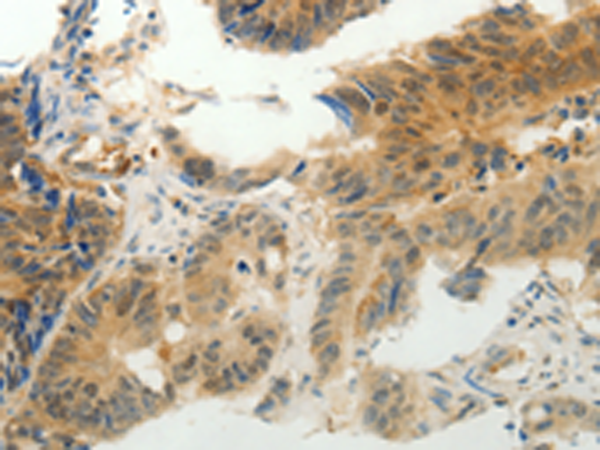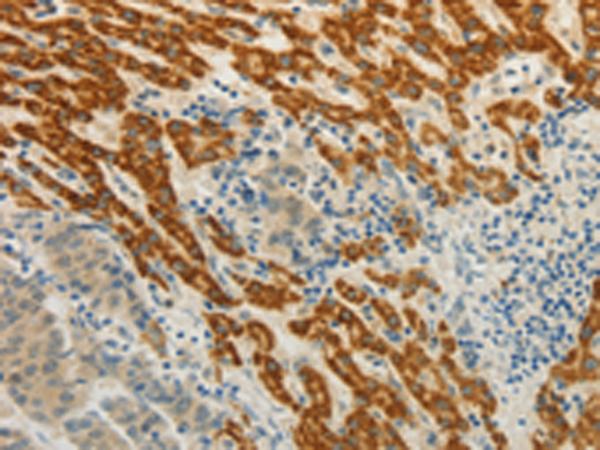

| WB | 咨询技术 | Human,Mouse,Rat |
| IF | 咨询技术 | Human,Mouse,Rat |
| IHC | 1/25-1/100 | Human,Mouse,Rat |
| ICC | 技术咨询 | Human,Mouse,Rat |
| FCM | 咨询技术 | Human,Mouse,Rat |
| Elisa | 1/1000-1/5000 | Human,Mouse,Rat |
| Aliases | CKLFSF7 |
| Host/Isotype | Rabbit IgG |
| Antibody Type | Primary antibody |
| Storage | Store at 4°C short term. Aliquot and store at -20°C long term. Avoid freeze/thaw cycles. |
| Species Reactivity | Human |
| Immunogen | Synthetic peptide of human CMTM7 |
| Formulation | Purified antibody in PBS with 0.05% sodium azide and 50% glycerol. |
+ +
以下是关于CMTM7抗体的3篇参考文献示例(文献信息为模拟,仅供格式参考):
---
1. **文献名称**:CMTM7 suppresses cell migration via EGFR signaling in human cancers
**作者**:Li Y, et al.
**摘要**:研究发现CMTM7通过调控EGFR信号通路抑制肿瘤细胞迁移,实验中使用特异性CMTM7抗体进行Western blot和免疫组化分析,证实其低表达与癌症进展相关。
2. **文献名称**:Characterization of CMTM7 as a tumor suppressor in lung adenocarcinoma
**作者**:Wang X, et al.
**摘要**:该文验证了CMTM7在肺腺癌中的抑癌功能,通过构建CMTM7抗体进行流式细胞术和免疫荧光实验,揭示其通过PI3K/AKT通路调控细胞凋亡。
3. **文献名称**:CMTM7 regulates PD-L1 expression and immune evasion in gastric cancer
**作者**:Zhang R, et al.
**摘要**:研究利用CMTM7抗体进行免疫共沉淀(Co-IP)及组织芯片分析,发现CMTM7通过调控PD-L1表达影响胃癌免疫逃逸,为潜在治疗靶点提供依据。
---
注:以上文献信息为示例,实际引用时建议通过PubMed、Web of Science等平台检索真实文献。若需具体文献,可提供更详细的研究方向或年份要求。
CMTM7 (CKLF-like MARVEL transmembrane domain-containing 7) is a member of the chemokine-like factor (CKLF) superfamily, characterized by a conserved MARVEL domain involved in membrane apposition and trafficking. It is widely expressed in human tissues, including immune cells, and plays roles in regulating receptor stability, immune responses, and tumor suppression. CMTM7 is localized to the plasma membrane and endosomes, where it interacts with transmembrane proteins such as EGFR and HER2. modulating their ubiquitination, internalization, and downstream signaling pathways (e.g., PI3K/AKT, MAPK). Its loss or downregulation has been linked to cancer progression, metastasis, and poor prognosis in malignancies like glioblastoma, breast, and gastric cancers.
Antibodies targeting CMTM7 are essential tools for studying its expression, localization, and molecular interactions. These antibodies (often rabbit or mouse monoclonal/polyclonal) are validated for applications including Western blotting, immunohistochemistry, immunofluorescence, and flow cytometry. Researchers use them to explore CMTM7's tumor-suppressive mechanisms, such as its role in destabilizing oncogenic receptors or enhancing immune cell activity (e.g., T-cell chemotaxis). Commercial CMTM7 antibodies are typically accompanied by knockdown/knockout validation to ensure specificity. Ongoing studies focus on its potential as a therapeutic target or biomarker in cancer and immune-related diseases.
×